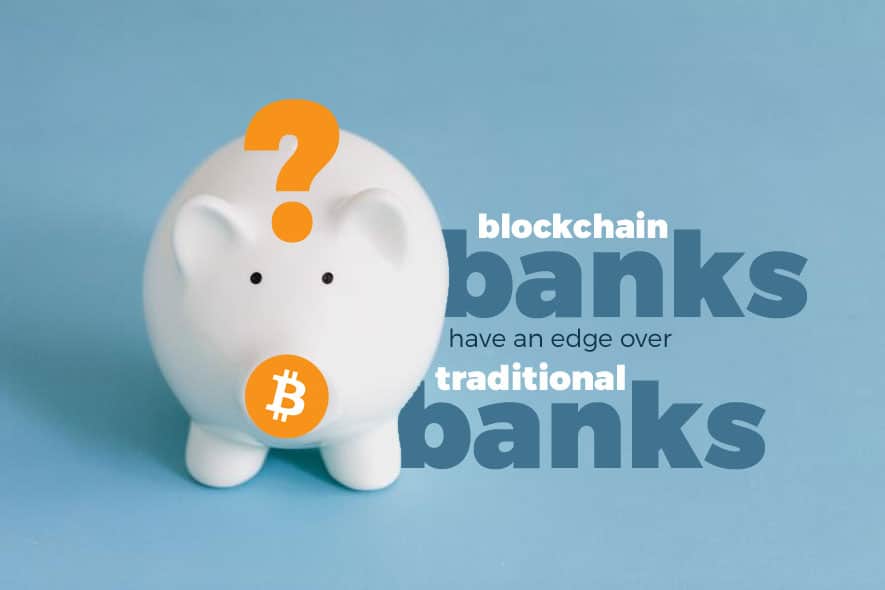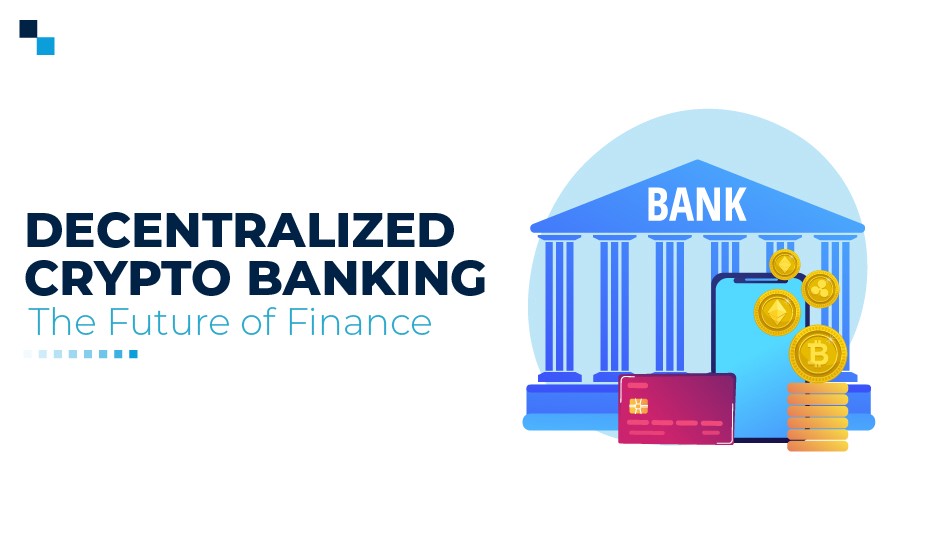Hi Friends,
I hope you must have enjoyed reading my previous article on “Cryptos & Blockchain Vs. RBI” in my blog & linked in .
Being revised here for a while, I had mentioned about the “Regulatory aspect & not the Banning aspect” to be looked after by the Indian Govt., on 19.05.2021 there is a news from the Govt. Circles that Govt. Has set up a Panel of experts to look in to the Regulatory aspect instead of banning it. I talked about the arrogant behavior of RBI towards Cryptos and this report clearly shows about my positive opinion.
Now, please enjoy my next article “Crypto Banks Vs. Traditional Banks”.

Crypto Banks Vs. Traditional Banks
A Banking system is a network of financial institutions where one can deposit and withdraw money.
To understand this article, let’s understand the terms : Crypto banks, Traditional banks, Blockchain banks based on blockchain technology, Crypto wallets, etc….
Crypto Banks : In simple terms, let’s understand that Crypto banks are banks where technology driven is blockchain technology, currency driven is cryptocurrency. A person can do transactions here in various cryptocurrencies supported by the crypto wallets provided by the crypto bank where person is holding his account.
Crypto banks are also under the definition of DeFis (Decentralized Financial System).
Traditional Banks : Such banks are the network or part of the network of worldwide financial institutions where a person can deposit & withdraw his money (fiat money).
Technology being used in the banking system :
Traditional banks are working on the internet and with their banking software programs. Crypto banks are working on the blockchain technology ( it is a system of recording of information or collection of data in a way that makes it impossible or difficult to change, hack or cheat the system upon which transactions are duplicated and distributed across the entire network of computer systems on the blockchain). Blockchain technology also needs internet to run itself.
Currency being used in the banking system :
Traditional banks work on fiat money as medium of exchange. Crypto banks use the cryptocurrencies as medium of exchange.
Permission-less :
Traditional banks are connected with their central command and permissions are needed to transact every transaction in the network.
Crypto banks are permission-less and no permission is needed to transact every transaction. There is no central command who can stop you from transacting.
Freezing :
Traditional banks can freeze your account and stop you from doing transactions.
In crypto banks, no one can freeze your account and stop you from using your cryptocurrency.
Medium Of Storage Of Money :
Traditional banks store your money in their manual vaults through the mechanism of accounts like saving accounts or current accounts. Digital fiat money is also stored in same way. Only one type of fiat money can be stored like in India- Indian Rupees, in USA – USD, in UK – GBP, and so one. Only business accounts are allowed to store more than one fiat currencies with lot of restrictions.
Crypto banks facilitate Crypto wallets for storing, transferring more than one crypto currencies by their clients. Such crypto wallets work on the blockchain. Subject to regulations of AML / KYC, anyone can open account with crypto bank which provides crypto wallet to store & transact crypto currencies which are normally more than one in nature and supported by the crypto wallet.
Cost & Speed Of Transfer Of Money:
Through crypto bank, You can transfer money from one part of the world to another part of the world at a fraction of cost what it would have been if such transfer is through traditional bank by wire transfer.
Time taken in such transfers is merely with in seconds if done by crypto bank and traditional bank may take much longer time.
When compared to the traditional banking system, blockchain technology can provide faster and more reliable payment solutions at a much lower cost.
Safer Trade Finance agreements through the use of Smart Contracts :
In case of crypto banks, Smart contracts exist to protect people and businesses when they enter in to agreements related to Trade finance. Smart contracts enable the automation of agreements through tamper-proof programs or codes those are running on the blockchain. Through smart contracts usage, escrow can be created for the safe storage of money which is released only when certain conditions of the agreement are fulfilled.
Smart contracts reduce the cost of operation, increase the speed of operation, reduce the element of trust needed to reach an agreement, minimize the risks of financial agreements and chance of ending up in court.
In case of traditional banks, same operations take more time, more costs, increased level of trust through more manual & paper work due to complicated nature of contracts and legal complications.
Lending & other merchant activities by banks :
Traditional banks have monopolized the lending sector and offer loans at relatively high interest rates and make such lending process very lengthy and expensive which makes it complicated for the borrowers.
Crypto banks allow anyone to participate in a new type of lending ecosystem which is part of the DeFi (Decentralized Finance). Crypto banks allow you to leverage the power of your stored cryptocurrency by availing loans on such stored money by unlocking the value of such stored digital crypto assets.
Interest on deposits being provided are normally high by crypto banks as compare to traditional banks.
Staking is allowed only by crypto bank to its’ account holders by pooling money in consortiums and further make high returns on such staked funds through mining activities. (I will cover mining in details in my future write-ups)
Staking is not allowed by traditional banks to their account holders but at large scale such banks come together at common platforms to pool their money in consortiums and lend same money to big business houses. So, with your money traditional banks make high returns and give you a peanut of such high returns. And interesting part here is that current account deposits never get any return from traditional banks.
Crypto banks also provide ATM cards, debit cards, credit cards etc. There are certain countries where ATM centers have been installed for the convenience of crypto account holders. Traditional financial players are also coming with crypto activities and providing same to their clients. Recently Visa card & Master card did same, PayPal also launched crypto activities from it’s platform. Big financial houses like JP Morgan, DBS etc. have announced crypto custodian facilities for their prime customers. Basically traditional financial players are also realising that crypto banks are the future of banking industry in the world.
Crypto Banks in the world :
Cashaa is the first which launched world’s first crypto bank in the world. Cashaa is the London based fintech & crypto company with it’s largest share of crypto banking in Europe. Cashaa has it’s own crypto currency known as “CAS” Token.
In India, Cashaa has opened it’s presence in the name of Unicas and serving Indian crypto industry from three locations in India.



 Bitcoin
Bitcoin  Ethereum
Ethereum  Tether
Tether  XRP
XRP  USDC
USDC  Solana
Solana  TRON
TRON  Dogecoin
Dogecoin  Bitcoin Cash
Bitcoin Cash  Wrapped Bitcoin
Wrapped Bitcoin  Litecoin
Litecoin  Shiba Inu
Shiba Inu  Polkadot
Polkadot  Ethereum Classic
Ethereum Classic  PancakeSwap
PancakeSwap  Decentraland
Decentraland  GALA
GALA  IoTeX
IoTeX  BUSD
BUSD